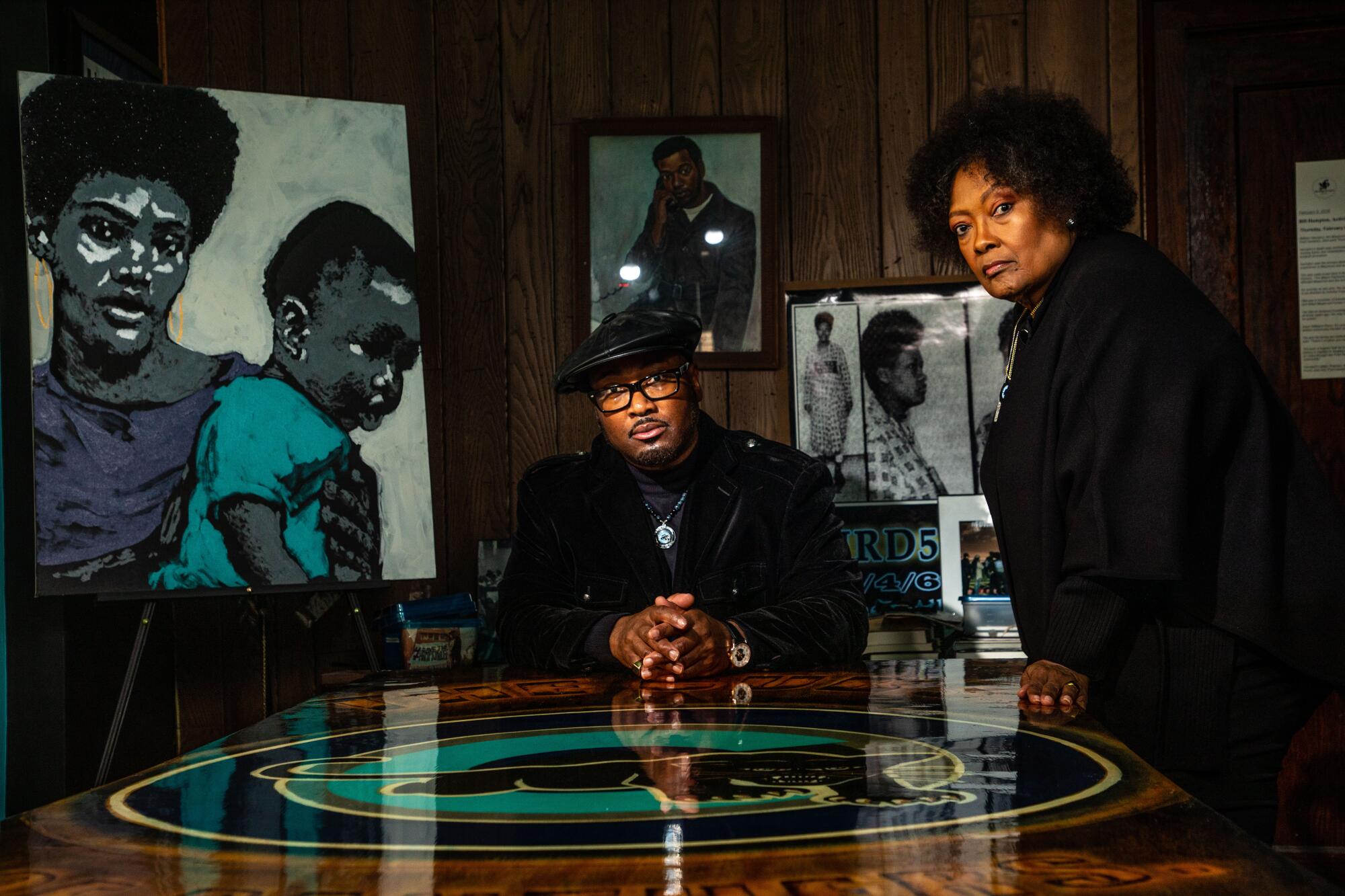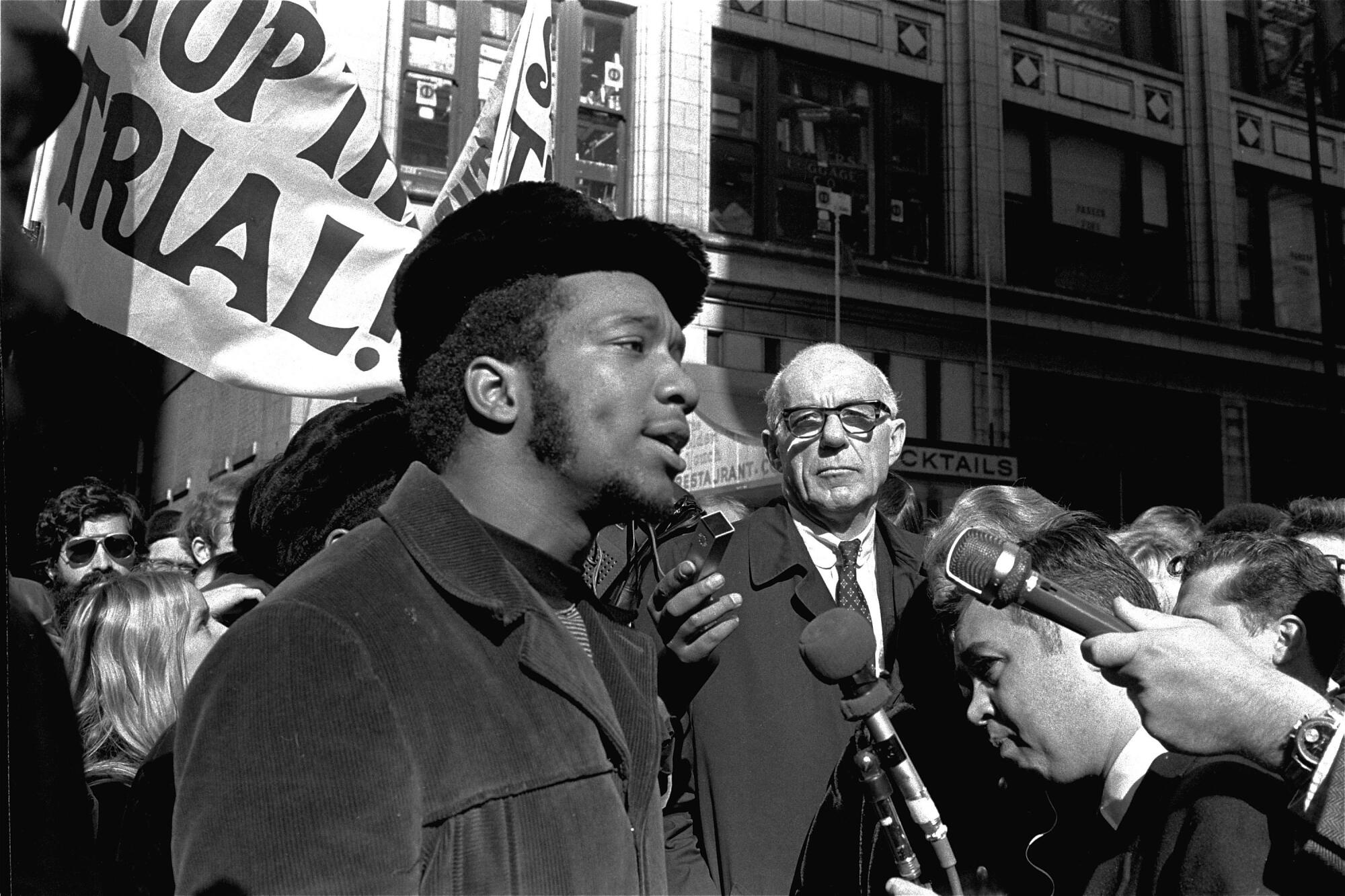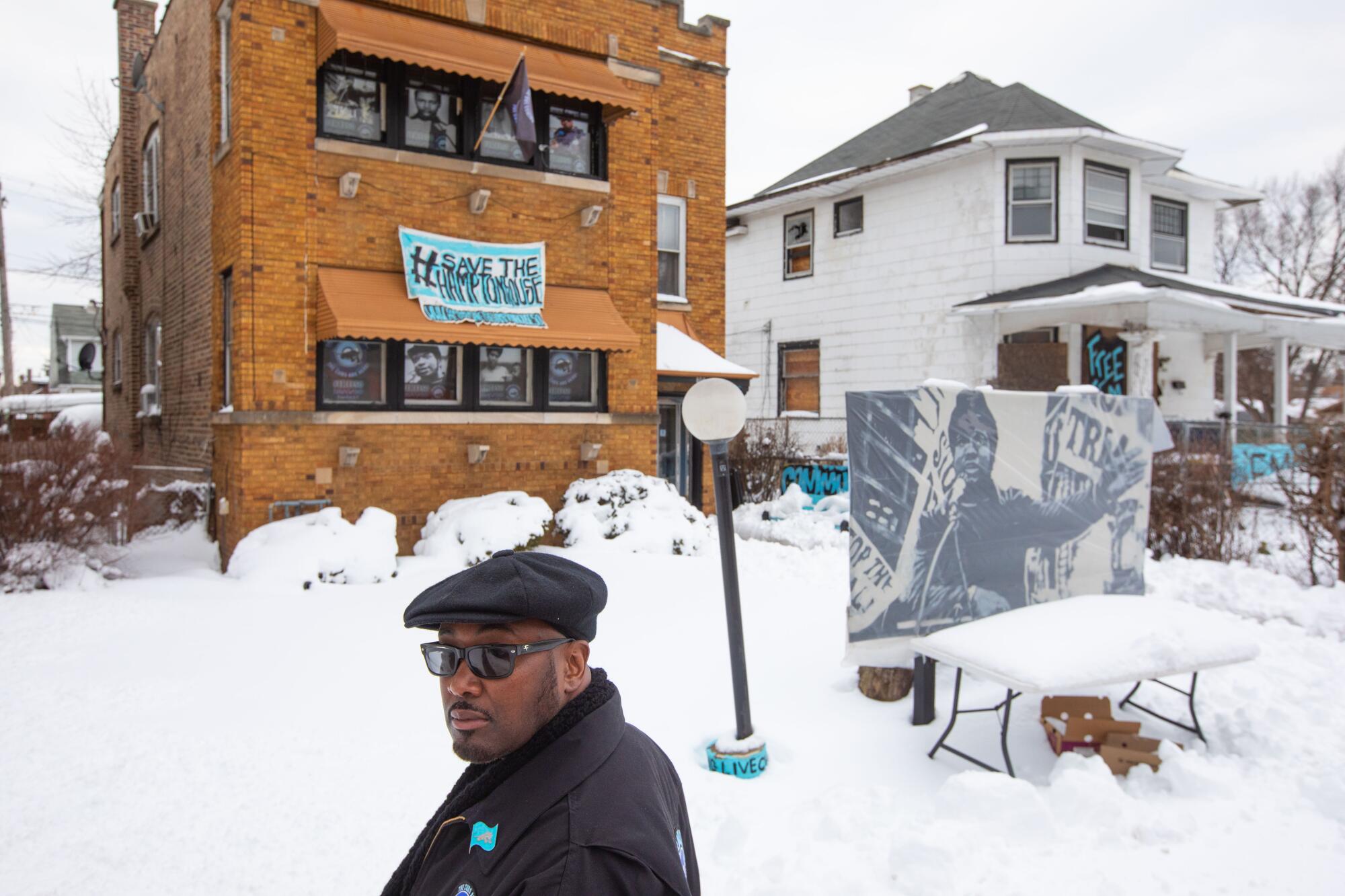
- Share via
In January 1990, activist Akua Njeri attended the funeral of William O’Neal, the man responsible for leaking information to Chicago police that aided in their assassination of her fiancée, Black Panther leader Fred Hampton, in 1969.
“I had planned to spit in the casket and then turn it over,” she said by phone from Chicago. “But when I got there, it didn’t look like O’Neal in the casket and I froze. I kept saying, ‘That’s not him.’ One of the brothers there said, ‘Oh yeah, that’s him.’ But it was a different O’Neal that was in the casket. So I didn’t get to do what I had planned for days to do.”
A career criminal turned FBI informant, the 17-year-old O’Neal infiltrated the Black Panther Party and quickly climbed the ranks to become one of the heads of Hampton’s security. He gave the FBI the layout of the apartment Hampton shared with Njeri and slipped the sedative secobarbital in Hampton’s drink so he wouldn’t wake up during the police raid and assassination. Hampton was just 21 years old when he was murdered.
O’Neal’s betrayal is the subject of Warner Bros.’ “Judas and the Black Messiah,” which has emerged as a key player in the current awards season and is now in general release where movie theaters are open and streaming on HBO Max. The film stars LaKeith Stanfield as O’Neal and Daniel Kaluuya as Hampton, the deputy chairman of the Illinois chapter of the Black Panther Party. Dominique Fishback plays Njeri (formerly known as Deborah Johnson).
“She really allowed me to develop the character how I saw fit,” said Fishback of the activist. “She didn’t say, ‘You have to do x, y and z.’ There were only two things that she mentioned: One, that she did not cry when they assassinated Chairman Fred. And she talked about how the Panthers were a very disciplined people and they didn’t speak out of turn, so there were just certain things that she wouldn’t have ever said to Chairman Fred.”
Director Shaka King makes his studio feature debut with the film, which he co-wrote with writing partner Will Berson (an early version of the script was written by Keith and Kenny Lucas). With producers including Charles D. King and “Black Panther” director Ryan Coogler, the film was originally envisioned as “The Departed” inside the world of the FBI’s counterintelligence program (COINTELPRO), said the director.
We haven’t even had biopics on wildly famous historical Black figures — the first Harriet Tubman biopic came out [two years ago]
— Director Shaka King on getting a film about Fred Hampton made
“I thought that was a brilliant idea, mainly because it’s the only way that you can get a movie about Fred Hampton or the Black Panther Party through the studio pipeline,” said King. “The studios don’t really make mid-budget films anymore and if you’re going to make a period piece, you’re probably going to have to spend upwards of $20 million. Those movies [have been] replaced by big franchises like ‘Star Wars’ and the Marvel films. So the few biopics that remain are traditionally going to be about a white person. We haven’t even had biopics on wildly famous historical Black figures — the first Harriet Tubman biopic came out [two years ago].”
“In the Black community, Fred Hampton has some level of name recognition,” he added. “But so many people who grew up hearing the name don’t even necessarily know how they know. Others just know that he was killed by the police. A lot of people don’t know that the FBI was really the architect of the conspiracy. Not to mention his politics are incredibly radical and anti-capitalist, in a studio system whose lifeblood is capitalism.”
Superb performances by Daniel Kaluuya and Lakeith Stanfield are at the heart of Shaka King’s drama about slain Black Panthers leader Fred Hampton.
That’s why, rather than making a straightforward Hampton biopic, it was decided that the story would be told from O’Neal’s perspective. “Initially it was just folded into the pitch,” said King, who says the movie is more about Hampton’s ideas than his life story. “And so the best way to highlight his ideology is to contrast it. So in a lot of ways, I think it is a strong choice to make William O’Neal a central character because you can indict capitalism in real time. You don’t have to talk about it objectively, you can show it.”
The decision to give O’Neal equal weight in the story was a major point of contention for Hampton’s family. “But there are pros and cons [to that choice],” said Chairman Fred Hampton Jr., now the head of the Black Panther Party Cubs, who was not yet born when his father was killed. “There’s a quote by Minister Huey P. Newton which says, ‘Contradictions are the ruling principle of the universe.’ And to [depict] the Black Panther Party, you must acknowledge the good, the bad and the ugly. This is an organization that was targeted and infiltrated [by the FBI]. So whose narrative it was coming from was and still remains a tender spot.”

The film’s title was inspired by a memo about Hampton written by former FBI director J. Edgar Hoover about preventing “the rise of a Black messiah” from within the Black Panthers’ ranks.
“Our position was that it be acknowledged not [to be] a metaphysical [comparison], but within the context in which Hoover had [spoken] with regards to the COINTEL program,” said Hampton. “Chairman Fred [Sr.] and the Black Panther Party were servants of the people. They made it a point that they were not above the people and so that narrative had to be included [to distinguish it was] not in an elitism type of way.”
“There were other titles that were floated, other stories that were floated and it was a battle back and forth,” said Njeri. “Down to the clothes that were worn, the music, who smoked cigarettes and who didn’t. We were on set so we had lots of struggles. Every battle wasn’t won, but many of them were.”
In fact, finding a version of the movie that satisfied King, the producers, the studio and the family was the biggest challenge of the production, the director said.
“It was challenging just working with the producers and the studio. You have a lot of different opinions and you had to really consider that this story matters more to [Njeri and Hampton] than to anybody in the world. Sometimes situations would arise where we had a disagreement about something we’d discussed because it’s way different reading the script and seeing the thing happen. We would have to do our best to accommodate. More often than not we were able to do that but sometimes we weren’t.
[Despite] having done as much research as we’d done, there’s no substitute for the real person ... They were incredible.
— Director Shaka King on working with Fred Hampton’s family for “Judas and the Black Messiah”
“But ultimately they were able to help us avoid so many pitfalls and so many mistakes that we would’ve thought were innocuous,” he added. “[Despite] having done as much research as we’d done, there’s no substitute for the real person. We would’ve made a lot of mistakes and offended a lot of people but they were able to help us avoid that. They were incredible.”
“We had to do a lot of damage control because there was so much misinformation [going around],” said Hampton. “And it’s been recently revealed that over 73% of the information provided about the Black Panther Party was authored by the FBI. So there were many days of saying, ‘We have actual individuals who were there and who are still here who are open to not only talk about it but put it into its correct political context.’”
One thing that came easy was casting the three leads. King says the process was intuitive. “Daniel has that mix of youthful charisma and gravitas that people say Chairman Fred had. LaKeith is always surprising and charming and sometimes can be impish [which was fitting for O’Neal]. And Dominique is an incredibly naturalistic actor. Since we’re talking about a living icon in Akua Njeri, I wanted somebody who felt like a real person. Dominique has the craft that allows her acting to be as seamless as a non-actor and so she was perfect in that regard.”
Getting the family on board was another story. After running into the chairman at an Oakland flea market, Coogler invited Hampton Jr. and Njeri to meet to discuss consulting on the film.
“We’ve been approached a lot about different movies,” Njeri said. “There have been a number of different attempts throughout our lives [for] books, movies, you name it,” said Hampton. “And we’ve taken a principled stance towards maintaining the legacy under contested conditions. It’s been a long battle to maintain that legacy.”
Before formally signing on, they invited the producers, King, Kaluuya and Fishback to the Hampton House in Chicago to discuss the vision for the story. “We have so many war wounds that we didn’t give it too much light initially,” said Hampton. “But after continuous contact, we finally sat down and had a discussion.”
Watching Daniel talk, I could see his brain turning. You could tell that he was intensely listening and processing. And then when he spoke about some of his past experiences, I said ‘OK, this will work.’
— Activist Akua Njeri, Fred Hampton’s widow
“We had a really good conversation,” said Njeri. “The meeting went on for about seven hours. When I was watching Daniel talk, I could see his brain turning. I could see him taking it all in. You couldn’t read what he was thinking, but you could tell that he was intensely listening and processing. And then when he spoke about some of his past experiences, I said ‘OK, this will work.’ He didn’t come to the table as the authority, he came as somebody who was willing to listen to the two people in the room who knew what they were talking about.”
Although she wasn’t familiar with the “Get Out” Oscar nominee’s work prior to their meeting, “I began watching him after that,” she said. “He’s a hell of an actor. But he’s a principled person too.”
Of his performance as Hampton, Njeri says, “He lit it up!
“The chemistry between him and Dominique made me realize for the first time in I don’t know how many years how much I missed the camaraderie and the political discussions with Chairman Fred Sr. and the stuff that I learned. I teared up because it took me back to a really good period and it also reminded me of how fortunate [I was] to be able to participate in the struggle in this period.
“It brought back so many memories and I was really emotional. A lot of things came back to me that you bury deep in the back of your head.”
She says the other actors were “magnificent” as well. “To LaKeith Stanfield I said, ‘You did great, but I can not hug you.’ They had a tremendous cadre of people acting in the movie.”
Although Hampton acknowledges the creative battles of the film are “an ongoing struggle,” he says it earned his endorsement. “There’s another saying, ‘A revolutionary is never satisfied,’” he said with a laugh.
In the wake of last summer’s social unrest against systemic racism and the police killings of Breonna Taylor and George Floyd, this moment seems ripe to bring Hampton’s story to the screen.
“People are just walking down the street and getting attacked and murdered by police and they’re getting off scot-free,” said Njeri. “Breonna Taylor was at home minding her own business and wasn’t a freedom fighter or a revolutionary and was murdered in her home. I think that the lesson that we have to take from [the ‘60s] is that we have a responsibility to fight back, whether that means sending donations or making copies of fliers.”
The Black community are the original victims of terrorism. We’ve been terrorized under such euphemisms as slavery, Jim Crow, redlining, gentrification.
— Fred Hampton Jr.
“We see terms such as police brutality as a euphemism, but our position is it’s police terrorism,” said Hampton. “The Black community are the original victims of terrorism. We’ve been terrorized under such euphemisms as slavery, Jim Crow, redlining, gentrification. We attempt to heighten the contradictions and put it in its correct political context.
“One of the mantras of Alcoholics Anonymous is ‘to address the problem, you must first recognize the problem,’” he added. “As opposed to gentrification, it must be recognized as land grabs. As opposed to correctional centers, these are concentration camps. As opposed to police brutality, this is police terrorism.”
Coincidentally, Hampton’s story is also briefly touched on in Aaron Sorkin’s 2020 film “The Trial of the Chicago 7,” in which the young revolutionary was portrayed by Kelvin Harrison Jr. in a relatively small role. Until the COVID-19 pandemic turned the film release schedule upside down, “Judas” planned to open first — in August 2020 — before “Chicago 7” would have hit theaters in September.
“I think the reason that you’re seeing movies about that time period made now probably has something to do with Donald Trump’s rise to power and the shift in culture that he brought,” said King. “Just as you saw the rise of QAnon and right-wing media, I think you’ve seen a stronger interest on the part of the studios to put forth content that satisfies left-wing viewers. Not necessarily out of some moral obligation, but just because there’s an appetite for it.”
“This is a climate where people’s political pores are open,” said Hampton. “Where there are certain discussions that people can relate to. We can’t detach the era of the Black Power movement of the ‘60s from Watergate, the tenure of former U.S. President Richard Nixon and U.S. aggression against Vietnam. We have a [comparable] climate now with the coronavirus and internal struggles between partisan politics. So there is a climate where people are forced to relate to certain dynamics, and it’s prime time for the Black Panther Party Cubs who serve in the interest of the people and fight for self-determination.”
Today, Hampton carries on his father’s legacy through his work with the Black Panther Party Cubs, the literal and ideological descendants of the Black Panthers who fight for political prisoners and continue in the ongoing protracted struggle for self-determination. “It’s a tough act to follow,” said Hampton. “We attempt not to walk in his footsteps but in their Panther paw steps. We draw correlations [between the Panthers and the Cubs] with our free breakfast program; one of our major information vehicles, Free Em All Radio, which is hosted by myself and Robin Allen, a.k.a. Lady of Rage, and the Black Panther Party intercommunal newspaper.”

“The Black Panther Party and the Black Panther Party Cubs go wherever there is people,” said Njeri. “They’re not afraid to talk to the people or to see what’s going on in the community.
“It’s really an honor for me to be able to still participate in this fight,” she added. “It keeps me energized. It keeps my brain and heart working to be able to be on the advisory board of the Black Panther Party Cubs and to be able to participate in the programs that they do. The struggle is noble. We haven’t achieved self-determination [yet] so I have a responsibility, a duty, to continue fighting. I’m very glad that I’m able to do that.”
Daniel Kaluuya, producer Charles D. King and writer-director Shaka King take us behind the scenes of ‘Judas and the Black Messiah’
More to Read
Only good movies
Get the Indie Focus newsletter, Mark Olsen's weekly guide to the world of cinema.
You may occasionally receive promotional content from the Los Angeles Times.









